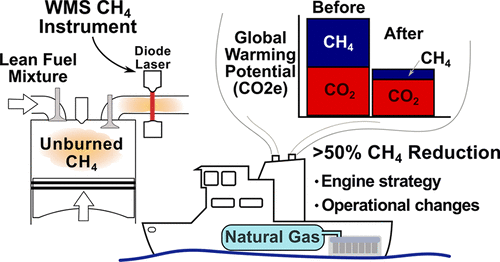Natural Gas Futures is pleased to announce that a new project focusing on emissions mitigation for in-use natural gas engines has been recently launched. NGF researchers forged a collaboration with FortisBC Inc., Seaspan Ferries Corporation, and Solaris Management Consultants Inc. to provide technologies for low-emissions engine systems, and quantitative emission characterization for inventory and policy development purposes. A total of $356,566 research grants were awarded by NSERC and Mitacs programs.
To reduce the climate impacts of transportation systems, several approaches have been identified through which greenhouse gas (GHG) emission can be reduced, primarily through CO2 emission reduction. These approaches include electrification of powertrains, bio-derived fuels, and fuels with lower carbon content. For large engine applications (e.g., marine, stationary power generation, remote applications), electrification is not yet realizable, and bio-fuels carry energetic penalties and may require significant engine modifications. For such applications, natural gas (NG) and natural gas from renewable sources (RNG) are attractive alternatives because of their lower CO2 and NOx emissions, and the significant North American NG reserves.
While natural gas is an attractive engine fuel to reduce these pollutants, it can also result in exhaust-stream CH4 emissions, which have a global warming potential (GWP) 28 times that of CO2 (on a 100 year timescale). Thus, all GHG emissions must be considered to ensure that the benefits of NG and RNG are realized, without also incurring unintentional increases in GHG or other emissions. This research will support the use of natural gas and renewable natural gas for engine applications by assessing and ultimately improving the in-use engine operation and emissions. The key objectives of this project are to:
1. Characterize in-use emissions and engine operation from NG engines, with a particular focus on CH4, CO2, PM, and NOX, under real-world operating conditions.
2. Develop strategies for GHG and other emission reductions, under the partner’s operational constraints.
3. Provide data and guidance for policy development to support effective implementation of natural gas engines and ensure GHG reductions.





0 Comments